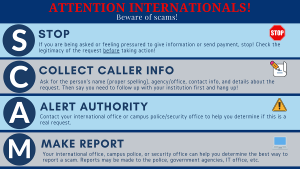
Tax, SSN, and Immigration Fraud Resources
Please be aware that there are a large number of tax, Social Security, immigration, and housing scams in the U.S. which target both Americans and international students and scholars. Most of these types of scams will spoof a government agency phone number in order to look official. Often they will attempt to steal personal information (identity theft) or attempt to get you to pay a fictitious fee or fine.
The IRS, DHS, and other government agencies will never contact you by phone or email.
Signs of a Scam Phone Call:
- Automated call/robocall notifies you that your Social Security Number has been suspended, requesting you to call back.
- A live caller requests you to pay a fine using Western Union, PayPal, Green Dot, MoneyGram or some other wire transfer service.
- Often the caller threatens your arrest or deportation for failure to act within a very short period of time.
- If it is a live caller, they will try to prevent you from hanging up, asking you to visit a retail store to transfer funds while remaining on the phone.
Scam Resources:
- Immigration scams
- Tax/IRS scams and Tax scam reporting
- Social Security Administration Scam Awareness
- FTC Consumer Information about money transfer and check scams
- Imposter Scams Information
- Consumer Information Blog
- Housing Scams Information
- Identity Theft Website
- Identity Theft Information
- Scams can be reported with the IC3
Online Marketplace Scam Resources
Besides major online retailers, a very popular resources for local purchases is through Facebook Marketplace, Craigslist, and other personal ads.
However, buying and selling through these services can be a challenge due to the large number of scammers who take advantage of the service.
When purchasing items through any online marketplace, please beware of scams.
Luckily, there are many resources to help educate yourself and protect against common scams and fraud.
- Facebook Marketplace Scam Resource Page
- Craigslist Scam Resource Page
- eBay Scam Resource Page
- PayPal Fraud Resource Page
- Cash App Fraud Resource Page
- Venmo Fraud and Scam Resources Page
- Zelle Fraud Resource Page
- Moneygram Scam and Fraud Resource Page
- Western Union Fraud Resource Page
Student’s Guide to Fraud Scams
The International Association of Financial Crimes Investigators (IAFCI), previously known as the International Association of Credit Card Investigators, has published a new resource, Student’s Guide to Fraud Scams (PDF). IAFCI is a non-profit international organization that provides services and an environment within which information about financial fraud, fraud investigation and fraud prevention methods can be collected, exchanged and taught for the common good of the financial payment industry and our global society.
The Student’s Guide to Fraud Scams outlines different scenarios for a variety of scams that range from tax scams and identity theft to PayPal and rides share scams.
Each section provides prevention tips for each situation and a top 10 list of fraud prevention tips are shared that include:
- Get your free credit report at annualcreditreport.com. Each year you may receive one free credit report from each of the three credit reporting agencies (Trans Union, Equifax or Experian). Upon receipt, check for unauthorized accounts, inquiries, and unknown addresses.
- Register to access your social security benefits statement at www.ssa.gov. Upon receipt, review your estimated benefits and earnings record. You should also ensure no one is using your social security number for employment or other benefits.
- Do not pay for merchandise online or via the phone using a debit card. Debit cards are vulnerable because they are linked to a bank account. You have a far better chance of resolving a fraudulent transaction when paying with a credit card rather than with a debit card. Also do not provide your debit/credit card numbers over the phone, via emails or on websites unless you initiated the call or order.
- Know who you are paying, via person to person payments, i.e., Zelle, Venmo, etc. Pay and receive money only with people you know. Don’t pay strangers with P2P (person to person). Most “person to person” transactions are instantaneous and irreversible.
IAFCI also provides a variety of consumer awareness resources, from identity theft information to online dating and emergency scams prevention. For more information about IAFCI or answers to questions, please contact them directly at 916-939-5000 or support@iafci.org.
